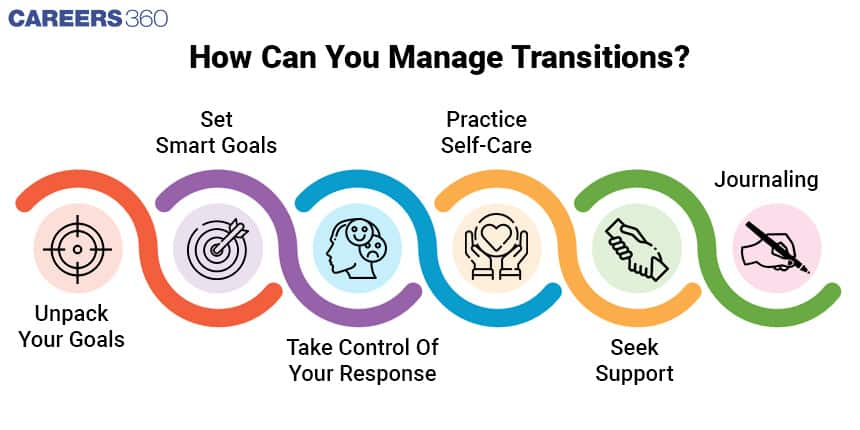6 Effective Ways For Students To Deal With Major Life Transitions
Have you ever been overwhelmed looking at multiple flights of stairs, thinking, “How on earth will I climb so many steps?” When we decide to make changes in our lifestyle, it could feel something like this. Knowing we want to get somewhere, but not knowing how we will be able to manage it.

Lifestyle changes often seem daunting and overwhelming, especially when they involve major shifts in our habits and routines — whether it's adopting a healthier diet, starting an exercise regimen, or quitting a bad habit. In spite of these challenges, the good news is that it is possible to approach these changes with small steps. By breaking down the change into manageable, bite-sized actions, we can make progress toward our goals without feeling overwhelmed or discouraged.
How Do Life Changes Impact Us?
While major life changes can be difficult for students, they can also offer valuable chances for personal growth, learning, and development. Therefore, it is crucial for students to have access to supportive resources like academic advisors, peer support groups, and counselling services to assist them in navigating these transitions. More importantly, their own attitude toward these transitions can either support or discourage the emergence of new skills and resources that these opportunities can provide.
In spite of whether the life event is positive or negative, change can be an uncomfortable experience. During transitions, an intrinsic sense of acceptance is essential, allowing them rather than resisting the tide to go with the flow.
 Major Life Changes Can Be Difficult For Students
Major Life Changes Can Be Difficult For Students
Different Major Life Events
For students, a major life event may refer to a significant change or experience that can have a profound impact on their academic, personal, or social life. Examples of major life events for students can include:-
- Starting a new school or university
- Graduating from high school or college
- Moving to a new city or country
- Losing a loved one
- Getting married or starting a family
- Experiencing a serious illness or injury
- Changing majors or academic programs
- Participating in a study abroad program
- Being involved in a serious accident or natural disaster
- Break-ups or losing friends
These events can be both exciting and challenging and may also require adjustment and adaptation. It is important for students to recognise the impact of major life events on their academic performance and seek support from family, friends, or counsellors when needed.
Also Read | Coping Mechanisms You Should Develop To Deal More Effectively With Situations
 How Can You Manage Transitions
How Can You Manage Transitions
How Can You Manage Transitions?
When you go hiking or have to go up a flight of stairs, it is impossible to jump right to the end and reach the top; the same way, when we experience these transitions in life, it is impossible to reach the goal in one go. It is a process and a journey and if we pay attention to the results the smaller steps give us, it is easier to track our progress and feel motivated to keep moving.
Here are some strategies you can use to break your transitions down into smaller steps.
Unpack Your Goals
When you look at the changes as a whole, it can be overwhelming. Before you start working on them, it is important to deconstruct them into smaller, more achievable steps, especially steps that you can see an observable result. For example, if a student is starting a new school, they can focus on one task at a time, such as learning their way around the building or introducing themselves to one new classmate per day.
Set SMART Goals
Setting goals that are specific to you and your style is vital to breeding motivation and a feeling of accomplishment. Making sure that your goal is SMART (Specific, Measurable, Attainable, Realistic, and Time-Bound). For instance, if a student is experiencing a major life change like moving to a new city, they can set a goal to explore one new neighbourhood or landmark each week.
Take Control Of Your Response
In any given situation, the only thing you have in your control is how you respond or feel about a situation. Sometimes, it can be difficult to figure out what you can do to make it easier. During these times, it is essential to work on building confidence within yourself to create a strong belief that no matter what happens, you will find a way to navigate through it.
For example, if a student receives a poor grade on an exam, they can focus on what they can control, such as talking to the teacher, developing a study plan, and seeking additional resources, to improve their academic performance and feel more confident in their abilities.
Practice Self-Care
Engaging in self-care activities, such as getting enough sleep and exercise, can be particularly helpful for students coping with major life changes.
For instance, a student can make a conscious effort to schedule time for activities that they enjoy, such as playing a sport, engaging in a hobby, going for a walk, or spending time with supportive friends, as this can help them feel more balanced, relaxed and better equipped to handle the stress and anxiety that often accompany such changes.
 Engaging In Self-Care Activities Can Help Students With Life Changes
Engaging In Self-Care Activities Can Help Students With Life Changes
Seek Support
Seeking support from friends, family, or school counsellors can help students feel less alone during major life changes.
For instance, if a student is experiencing a breakup or a falling out with their friend, they can reach out to a counsellor at their new school or out of school for guidance and support.
Journaling
Major transitions can cause a lot of dissonance in a person's feelings, thoughts, and behaviours, which can lead to overwhelm, "brain fog," lack of focus and concentration, and withdrawal from enjoyable activities. One effective strategy to cope with these challenges is to journal and write down their thoughts and feelings regularly. This can help lighten the emotional load, clear out unfinished thoughts and scenarios in the mind, and create more mental clarity. By putting their thoughts on paper, individuals can better understand their emotions, make sense of their experiences, and move forward with more focus and perspective.
Making big lifestyle changes can be intimidating and stressful, but these changes can be approached in small steps. It is critical to identify the influence of major life events on our academic performance and to get assistance when necessary. We may manage major transitions and accomplish our goals by employing different strategies including engaging in self-care, getting assistance, and journaling.
Remember that it is a process and a journey, and it's important to pay attention to the results of the smaller steps we take to track our progress and feel motivated to keep moving.
Also Read | 7 Tips To Convey Your Struggles To Your Loved Ones
Ichha Bhan is a counselling psychologist, and personal growth coach. She holds more than 5 years of hands-on experience in working with children and adolescents, helping them and their parents navigate shared emotions, and the challenges of growing up.
